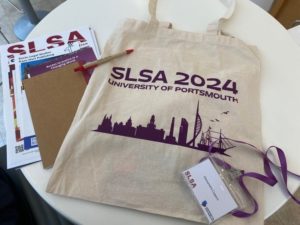Ellie Colegate from the 2021 Cohort reflects on her recent attendance at the Socio-Legal Studies Association Annual Conference hosted by the University of Portsmouth in April 2024 and the process that led to her presentation.
post by Ellie Colegate (2021 cohort)
“the course of obtaining a publication never did run smooth” – William Shakespeare…if he did a PhD or worked in a research position.
I have learned over the last few years that there is no linear process to writing a research paper. When it comes down to writing a paper and disseminating your work and ideas to the world it’s you, your notes, your findings and quite often your laptop doing battle in your mind to produce something that is understandable (we hope!) and illustrates your findings or thoughts in a cohesive way.
Writing a research paper is a highly personal experience, no matter the subject of the paper. So, when a paper is rejected or receives quite a lot of feedback, it can be disheartening and can sometimes make you question if you’ve got what it takes. However, last year I learnt that rejections aren’t always rejections; sometimes, they’re redirections.
In May 2023, WhatsApp introduced an editing window for messages that enables a sender to make changes to text that previously would have been permanent and unchangeable. Advertised as great for correcting typos—we’ve all been there—or adding extra context if you’ve missed an essential emoji, the introduction of a 15-minute window was promoted as being great if you “simply change your mind.”
As someone whose research revolves around the online harms young people experience due to online content and the legal interventions introduced to reduce these, this got me thinking. What about if someone changes a harmful message already read so that it is not harmful anymore?
So, I got to work on my paper concerning ‘Edited and Disappearing Content’ – focusing on WhatsApp as the platform offering edited content and Snapchat as the platform offering content that disappears – and how, in certain circumstances, these types of content have the potential to harm young, aged users. Utilising existing reports outlining how and why young people were harmed online in the last few years, I analysed the newly introduced laws contained within the Online Safety Act 2023 alongside the ability for users to edit their content and make such disappear to illustrate how these features could cause issues for the overall aim of the law to reduce harmful interactions and content online.
From the outset, I had a journal in mind for this paper so worked to their specification. However, about a week after sending it off I received the “Thank you for your submission.” Email which continued with “unfortunately we will not be able to send your manuscript out for review.” The reason? Whilst the topic was of great interest, the journal was moving in a direction of empirical based work, of which my paper was not. But they hadn’t said “No thanks, you’re work isn’t good enough.” They’d said, “We like the ideas, we’re just going in a slightly different direction.” It was redirection, not a rejection.
A few months later I received the call for papers for the Socio-Legal Association Conference 2024 so decided to resurrect the paper sat gathering digital dust in my files and try again. The conference wanted submissions concerning how the law as written down in statutes might operate in practice and impact society and vice versa, sounded appropriate for my work. In January 2024, for the second time I hit the submit button, and to my relief, this time, it was accepted.
Fast forward to April and the paper was a part of in the IT and Cyberspace stream of the conference. Unfortunately, I couldn’t attend in person in Portsmouth, however, I was still able to attend various sessions and engage with the posters. A test call at the start of each day for virtual presenters gave us an opportunity to test sound and slides which took a lot of the stress away from the actual presentation. Presenting virtually didn’t alter my experience I don’t think, the stream organisers and another panellist were also online, so the audience were equally engaged as I imagine they would’ve been if I was in person – even if I’m still slightly mortified that I caught a glance at the room at one point and realised I was projected like some sort of academic cinema!
I presented from my desk at home, but if I did go to Portsmouth, I imagine I would’ve looked something like the below:

Credit: Alessandra Cuppini via Twitter

Credit: Brian Aitkenhead on Unsplash
The value of feedback given at conferences is something I fear is overlooked. But fresh eyes and levels of expertise can really help develop your ideas, whether you take them forward and write (or in my case adjust) a research paper or fold these ideas into your thesis and other outputs. Conferences are great for networking but equally are great for signalling to people ‘I’m working on this, I’m still figuring it out, any thoughts?’ So, I write everything down, the questions I’m asked as well as the feedback I get to fold back into the paper if it’s still a work in progress.
If it wasn’t for that first rejection, I wouldn’t have been redirected to the SLSA Conference, sure I might have had a published piece of work in the journal I’d scoped, and I probably would’ve submitted something else to the Conference for consideration. But I wouldn’t have learnt a valuable lesson I’m taking with me for the rest of my career: rejections aren’t the end of the world, and they aren’t always your fault.
The world didn’t end because a journal rejected me, my PhD didn’t fall apart before my very eyes, I was redirected to a venue from which I have made valuable connections with others and am awaiting news about a special edition. So, the work will likely still see the light of day in published form, it’s just a bit later than expected, and that’s okay for me. As Shakespeare might have said, the route to publication never is smooth.
The link to the full paper and slides can be found at:
How Edited and Disappearing Content Poses a Challenge to The UK’s Online Safety Regulations Tackling Harm Facing Young People Online

